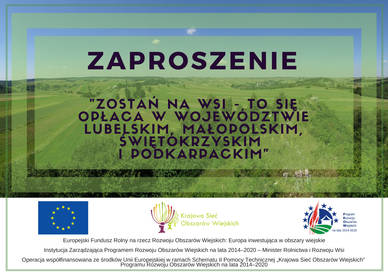“Stay in the countryside – it pays off” campaign for youth
Many young people leave mountain regions because they see few opportunities on the labour market and have no prospects for the future. In four Polish mountainous regions, a campaign was conducted to inform young people about the opportunities offered by rural development funds for youth employment.
Mountain youth out-migration
In some mountain areas, maintaining territorial attractiveness among young people is challenging the vitality of regions. Although some young people choose to stay in the mountains for their quality of life and proximity to nature for example, others decide to study or work in the city and never return.
In Poland, some mountainous regions are confronted to the rural migration of the youth. In region Podkarpackie for example, the share of inhabitants below 25 years old has fallen from 30% to 26% only between 2014 and 2018 (European Atlas of Demography). At the same time, Poland is among the European countries where mountain areas are ageing faster than non-mountain areas – together with Slovakia, Portugal, or Spain (Joint Research Centre, The demographic landscape of EU territories: Challenges and opportunities in diversely ageing regions, 2021).
Rural development opportunities as chances for the youth
To encourage young people to stay and live-in rural areas, the « Stay in the countryside – it pays off » campaign was carried out in 2018 in the four mountainous regions of Małopolskie, Świętokrzyskie and Podkarpackie and Lubelskie. The overall aim of the initiative was to showcase the employment and entrepreneurship opportunities offered by rural areas, promote the socio-economic inclusion of young people in these regions and explain the available financial support from rural development funds.
To this end, 4 workshops were organised in the 4 project regions. These local training events targeted a total of 280 young people below 35 years-old and sought at encouraging their social and civic participation to rural life and their professional integration in these regions. Workshops were therefore designed as places to exchange ideas and inspiring good practices from across the country to illustrate the variety of possibilities in rural areas.
A key element of the workshop also consisted in informing young people about the priorities and funding opportunities offered by the 2014-2020 Common Agricultural Policy (CAP). Apart from CAP support to young farmers, participants were also introduced to the financial support that the CAP can provide to young entrepreneurs in rural areas, through its Pillar 2 objectives. By raising awareness on these funds, the initiative can boost youth entrepreneurship in these mountain areas.
